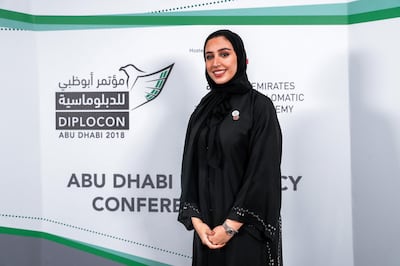Hundreds of ambassadors, academics and government officials gathered in Abu Dhabi last week. Mingling among them were dozens of the UAE’s future diplomats - the students at the Emirates Diplomatic Academy.
As the first Diplocon drew to a close, four of the diplomats-in-training agreed it was a desire to “give something back” to their country that had inspired them to sign up.
“The United Arab Emirates has provided so much, provided a very safe nation,” said Hamda Al Shaiji, a 22-year-old from Dubai, who wants to represent the UAE in cultural affairs.
“It has made its citizens happy, safe and at the same time let them travel wherever they want. It’s a small part of our duty.”
But how would the young diplomats feel about being posted to somewhere that is not so safe? They have all lived abroad for short periods to study or work, but in mostly stable, developed countries, such as Australia, Germany, the US and South Korea.
“We have definitely thought about that, I think every trainee has thought about that,” said Bakhita Al Remeithi, a 22-year-old from Abu Dhabi. “But we have all said we want to serve our nation and give back. If that means serving in dangerous countries we would never object to such a thing, if it helps in representing our country.
“We have soldiers in Yemen. They are in a difficult situation. Us, living in a dangerous country, is nothing compared to that.”
They hope that in their roles, they will be able to prevent the need for their compatriots to put themselves in danger on the battlefields of the future.
_________________
Diplocon reports:
War games simulate India and Pakistan nuclear crisis at UAE summit
Minister fears voices of intolerance becoming louder across the globe
Nations must break up the diplomatic boys' club, UAE summit hears
Gargash: in the 15-minute news cycle, we can't afford to ignore criticism
Middle East states 'need to speak to their enemies'
_________________
Hamda recalls a lecture from Bernardino Leon, the head of the academy and a former UN envoy. “Diplomats are the first line of defence,” she remembers him telling her class.
Rashid Al Zaabi, a 34-year-old student from Ras Al Khaimah, sees diplomats as a kind of soldier who protects against instability or attack through the skilful exercise of soft power.
“Diplomats play a critical role in fixing situations and preventing any war or problems,” he said. “And we can ensure that we deliver a stable country to the next generations.”
Mohamed Al Areefi, who wants to help the UAE economy by brokering international deals in areas such as culture and nuclear power, expands on the analogy.
“It goes beyond just defending the country,” the 31-year-old, from Abu Dhabi, says.
“We promote partnerships, we promote interdependence with other countries, integration with other nations. Cooperation from a cultural perspective, economic perspective, so it goes much beyond defending the country, it’s establishing proper partnerships and cooperation between nations.”
At the conference stage in the main hall, speaker after speaker spoke of the pressing need for good diplomacy, given the fraught global picture. New conflicts are emerging in the Middle East while the Trump administration tears up an international consensus built up over decades regarding trade.
But if the students are daunted about starting their careers at such a turbulent time, they do not admit to it. They will graduate in June, with academy students typically going on to secure a diplomatic posting, or return to government-linked companies, which require skilled diplomats, or studying overseas.
More than 60 per cent of students are women, it was revealed at the conference, as the academy launched ambitious plans for the UAE to become a leader in gender equality in diplomacy. The attitude is reflected among the students, who recently elected a female as their student council president in an open election.
They say they are proud to see the UAE take a lead in the area and in diplomacy more widely, saying the conference had allowed them to make connections already which they hope will serve them well in their future careers. In a hall of seasoned politicians and diplomacy veterans, many of the questions from the floor came from academy students.
“I think at this time the world needs diplomats,” says Bakhita.
“It’s never been more of a crucial time, so this is the time to be a diplomat. Our country is trying to make peace, settle issues, address complex issues. So there’s no better time than now to help in peacemaking and in the vision of this country, to help create a more integrated and cooperative world.”
Hamda agrees, saying moderate voices are essential as others rush to extremes. “If, as a diplomat, your job is not challenging, then you’re not doing your job right,” she says. “This is the century to be a diplomat. It’s a time to prove peace is still there and we will avoid conflict.”


